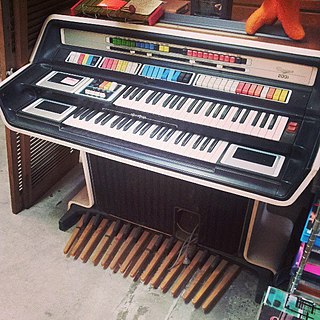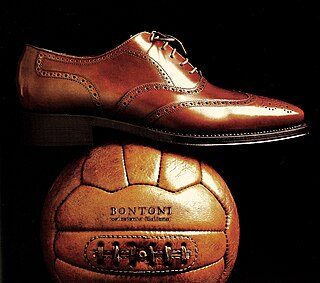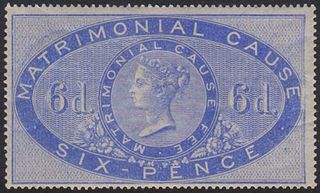This article needs additional citations for verification .(August 2009) |

Zanchi (later spelled Zanki) is an Italian brand of cymbals. The brand was made between 1947 till around the mid 1990s, and was noted for its 'Vibra' cymbals.
This article needs additional citations for verification .(August 2009) |

Zanchi (later spelled Zanki) is an Italian brand of cymbals. The brand was made between 1947 till around the mid 1990s, and was noted for its 'Vibra' cymbals.
Italian cymbal-maker, Fiorello Zanchi, reputedly started out working for the Tronci family of cymbal/pipe organ makers in the 1920s, according to Pinksterboer. [1] Per the same source, it is said that Fiorello started his own workshop, Zanchi, in 1947, and began producing handmade, hand-hammered cymbals. However, to date none of these pre-50s Zanchis have shown themselves on the market (see below). Zanchi cymbals were marketed primarily in Europe. Fiorello and Figli (Fiorello Zanchi and Sons) were responsible for all Zanchi cymbals. They changed the spelling to Zanki to prevent foreigners from mispronouncing the name. Carlo Biasei (UFIP) depicts Fiorello Zanchi as the teacher of all Pistoian cymbal makers: "He was the man with the golden hands". In the company's heyday, the early 1950s there were around fourteen people working at the factory. In the 1970s the demand for Zanchi cymbals became so great (mostly in the U.S.A. distributed by Unicorn), the company couldn't deliver sufficiently, which led to their closing in 1992.
Some of their earlier series included the "Vibra Cymbals" line; for a number of years, Vibras were believed to have been produced in the 60s or 70s. Recent information provided by an owner of some hi-hats in Connecticut confirms that his were purchased in 1958, so this is the oldest attribution anyone has contributed thus far. A few F & F Vibra cymbals have appeared on the market which also show the "Revere" embossment: interesting because Revere was an early stencil brand of Pearl, Japan in the 60s, so one[ who? ] may presume that, for some period of time, Zanchi had a business relationship with Pearl, However, Revere was also a stencil brand of Kent drums which were American made and sold. Later Kent did sublet some of their manufacturing to Pearl. But the Revere Spotlight cymbals were made by Zanchi for Revere made by Kent drum Company. Vibras were B20 Alloy, usually thin, and are described by some as trashy sounding. Yet, their sizzle and iciness are considered by some musicians[ who? ] to be unique, even by today's standards.
In the 70s, the company name was changed to Zanki, perhaps because the Italian "ch" is pronounced as a "k"; or, perhaps, simply as a marketing device. During the 70s, Zankis usually had large ink logos with the 'Zanki' name. Sometimes the character font was hollow, sometimes bold. The embossed stamp was changed to read "ZANKI Italy". These cymbals were still handmade, but were heavier, and more conventional-sounding, and are considered by some[ who? ] to be comparable to a late 60s or early 70s Avedis Zildjian cymbal. Zanki occasionally still used the name Vibra on some of their 70s series cymbals, but they do not resemble the F & F Vibras from earlier, in either hammering or lathing.
Perhaps Fiorello Zanchi's biggest contribution to cymbal-making history was his development of the "rotocasting" technique, in which molten bronze is poured into a cymbal cast that is mounted on a centrifuge, and rotated as the liquefied metal is being cooled inside the cast. This new technique created a brand new sound in Italian cymbals, much brighter than the previous Zankis. It is reputed[ where? ] that Fiorello used the larger workshop at UFIP to do his rotocasting. These rotocast cymbals bore a new embossed stamp, "Zanki Rotocasting". Some of these cymbals also show an additional embossment that reads: "Music Industries". Still others show an ink stamp by the Italian distributor "Mario Corso". It would appear from the varying stamps of this period that Zanki was associating with different distributors in an attempt to keep the cymbals on the market.
According to Pinksterboer, Fiorello Zanchi died in the 80s and his sons, Mariano and Roni, continued the company. Ultimately, however, at some point in the late 80s or early 90s, F & F Zanki (like many other small, independent cymbal/gong-making families in Italy at the time, including Tronci and Tuscano) could no longer compete with the larger cymbal-makers. Amid concern that the Italian tradition of cymbal-making was at risk of becoming extinct, many of the smaller operations joined under the banner of the largest/oldest Italian union/workshop, UFIP, and ceased independent production. Thus, Fiorello and Sons brought to UFIP the technique of rotocasting, which is a UFIP trademark today.
As F & F Zanki was more or less targeting the mid-price range of the market, some of its cymbals are considered to be mediocre at best, while others ranged from "exceptional" to "not too good at all". The varying quality of these remaining cymbals may well be why they remain relatively obscure. However, Zankis are significant in cymbal-making history and Fiorello Zanchi deserves his place on the list of notable cymbal artisans.
Their signature stamp reads: "F & F Zanchi, Made in Italy". "F & F" stands for "Fiorello e Figli" (Fiorello and Sons).

A handicraft, sometimes more precisely expressed as artisanal handicraft or handmade, is any of a wide variety of types of work where useful and decorative objects are made completely by one’s hand or by using only simple, non-automated related tools like scissors, carving implements, or hooks. It is a traditional main sector of craft making and applies to a wide range of creative and design activities that are related to making things with one's hands and skill, including work with textiles, moldable and rigid materials, paper, plant fibers, clay, etc. One of the oldest handicraft is Dhokra; this is a sort of metal casting that has been used in India for over 4,000 years and is still used. In Iranian Baluchistan, women still make red ware hand-made pottery with dotted ornaments, much similar to the 5000-year-old pottery tradition of Kalpurgan, an archaeological site near the village. Usually, the term is applied to traditional techniques of creating items that are both practical and aesthetic. Handicraft industries are those that produce things with hands to meet the needs of the people in their locality without using machines.

The Avedis Zildjian Company, simply known as Zildjian, is a musical instrument manufacturer specializing in cymbals and other percussion instruments. Founded by the ethnic Armenian Zildjian family in the 17th-century Ottoman Empire, the company relocated to the United States in the 20th century. Today, it is the largest cymbal and drumstick maker in the world.
Modern cymbal making comprises many different techniques, from traditional hand methods to completely automated mass-production.

A rubber stamp is an image or pattern that has been carved, molded, laser engraved, or vulcanized onto a sheet of rubber. Rubber stamping, also called stamping, is a craft in which some type of ink made of dye or pigment is applied to rubber stamp.

Embossing and debossing are the processes of creating either raised or recessed relief images and designs in paper and other materials. An embossed pattern is raised against the background, while a debossed pattern is sunken into the surface of the material but might protrude somewhat on the reverse side.

UFIP, an acronym for Unione Fabbricanti Italiani Piatti is an Italian musical instrument manufacturing company based in Pistoia, Tuscany.

Pearl Musical Instrument Company, simply known as Pearl, is a multinational corporation based in Japan with a wide range of products, predominantly percussion instruments.
The Buescher Band Instrument Company was a manufacturer of musical instruments in Elkhart, Indiana, from 1894 to 1963. The company was acquired by the H&A Selmer Company in 1963. Selmer retired the Buescher brand in 1983.

The Thomas Organ Company is an American manufacturer of electronic keyboards and a one-time holder of the manufacturing rights to the Moog synthesizer. The company was a force behind early electronic organs for the home. It went out of business in 1979 but reopened in 1996.

Bontoni is an esteemed Italian luxury shoemaker from Montegranaro that crafts a limited number of handmade men's dress shoes each year. The brand is known for its unique designs, use of richly hand-colored leathers, premium quality materials, and outstanding handiwork.

Sigma Guitars is a guitar manufacturing brand originally released by C.F. Martin as a line of guitars at affordable prices to compete with the increasing number of imported guitars from Japan and elsewhere. The Sigma line was discontinued by Martin in 2007. The rights to the name were acquired by German company AMI Musical Instruments GmbH, which relaunched the brand with guitars being produced in China.

The Western Knife Company was a manufacturer of hunting knives which began operations in Boulder, Colorado in 1911. The company is probably best known for its "Bowie" style hunting knives. The company was purchased by Coleman in 1984. Camillus Cutlery Company purchased Western in 1992. In February, 2007, Camillus closed as a result of bankruptcy due to competition from companies making cheaper knives in other countries. The Western brand and Camillus brand are now owned by the Acme United Corporation and manufactured in Asia.

Levin was a Swedish manufacturer of musical instruments founded by Herman Carlson Levin. Active from 1900 to 1978, the company produced over half a million instruments, mostly guitars, but also mandolins, banjos and lutes, making Levin the largest instrument manufacturer in Scandinavia for many years. Levin is best known for originating Goya acoustic guitars.

V. La Rosa and Sons Macaroni Company was founded in 1914 by Vincenzo La Rosa, a Sicilian immigrant. The company eventually became one of the largest regional brands in the United States producing over 40 varieties of pasta.

Gallery Park Hotel & SPA is a 5 star hotel in Riga, Latvia, Gallery Park Hotel & SPA was established in 2009 after the grand restoration and has been already awarded the Best Hotel in Latvia and is located in the heart of Riga in a 19th-century building that is on the list of the World Heritage sites by UNESCO.

Revenue stamps of the United Kingdom refer to the various revenue or fiscal stamps, whether adhesive, directly embossed or otherwise, which were issued by and used in the Kingdom of England, the Kingdom of Great Britain, the United Kingdom of Great Britain and Ireland and the United Kingdom of Great Britain and Northern Ireland, from the late 17th century to the present day.

Stamps of the Soviet Union were issued in the period 1923 to 1991. They were labeled with the inscription Russian: "Почта СССР". In the thematics, Soviet stamps reflected to a large extent the history, politics, economics and culture of this world's first socialist state.

The Leedy Manufacturing Company was an American manufacturer of percussion instruments headquartered in Indianapolis, Indiana. Leedy was highly successful in the early twentieth century, and was at one point the largest manufacturer of drums and other percussion instruments in the world.